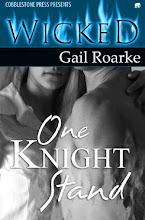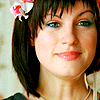
Welcome to the second weekly post in the How I Write series. This series of posts is the brainchild of Ansha Kotyk, who--along with the other participants, including Yours Truly--haunts the forums (registration required) of the Romance Divas website. You can go here to find a list of all the participants with links to their individual blog posts. We'll each be posting on the same topic each Wednesday for the next two or three months--longer, if it goes well and we're having fun with it.
This week's topic is wide open: Plot, character arcs, and world-building--whatever we want to tackle.
I'll start with plotting. Mostly, I don't. That is, I am a seat-of-my-pants writer. I've tried plotting out my stories beforehand and it never works for me. I haven't given up on trying--I think it would be a useful tool for my toolbox, but so far it's never worked. I get an idea and try to flesh it out, but I keep spotting holes in the plot, so I tinker and tinker with the plot until it dissolves like wet tissue paper and I give up on it.
What does work for me is making up the story as I go along. I start with a scene conflict--usually the opening scene, but not always--and just start writing. As events unfold I discover what the plot is. This often involves going back and adding scenes earlier in the story to lay the groundwork for a later conflict. Sometimes it means reworking a scene or throwing one out entirely. Such scenes go into my "cut scenes" file, where they may eventually be recycled, in whole or in part, in another story.
*I should point out that I'm not really 'discovering' anything. I'm making it up, but it often feels like a discovery because a lot of the work goes on in my subconscious. I don't like it when people disown their agency, when they speak of having a muse, or of muses speaking to them--or deserting them. Own your creativity, people!
As for world building--I repeat, I'm a seat-of-my-pants writer. I've written superheroes, fantasy, science fiction, and contemporary fiction. Just like when I start a story with minimal plot, I start with a basic idea of what sort of world the characters inhabit. Often those details are dictated by the story I want to tell; some particular details of government or culture or geography are required to make the story work. The other details often don't get fleshed out until they come up in the course of writing the story. This would happen anyhow--no writer can anticipate all the details she'll have to provide to make the world real to her readers. But it can be exciting--and sometimes a little scary--to discover, as your characters do, that some facet of the world around them is going to materially influence the plot.
The most recent example of that is in the recently-completed manuscript for my SF novel about the man who repossesses starships. The starships take off and land like jet aircraft. When they get high enough--in air too thin for the air-breathing jets to function any longer--they switch to onboard rocket fuel and the jet engines function like rockets to take them out of the atmosphere. (Such engines don't actually exist yet, but they've been contemplated and they're feasible.) Only then, in vacuum, can they fire up the FTL drives that take them from one system to another.
I decided all this the first time I wrote about my hero making off with a starship. It was just color--until later in the manuscript, when the fact that starships need long, long runways to land on when they de-orbit affected the plot. It sent my hero on a cross-continental journey he hadn't anticipated, and meant that many more obstacles to achieving his goals. I fleshed out a great many other details about the world in which he lives, some of which I will have to go back and add to earlier scenes as I work on the first revision of the novel.
Plotting and world-building are both very organic processes, at least for those of us who don't plot it all out ahead of time. And for me, at least, that's part of the fun. I'm never quite sure what I'm going to write, so it's often as much of an adventure fore me as it is for the characters. And, I hope, the readers.









Hehehe, like my husband - I own my creativity when it's behaving the way I want it to, and figuratively disown it when it isn't. So I never really took people who refer to their muses as a separate entity quite that literally.
ReplyDeleteGood post, very interesting to learn the methods that are different from my own.
I'm somewhat in awe. I must have an outline. I need to know where I'm starting, where I plan to end up, and at least a few of the high points along the way. I can't imagine sitting down without a plan.
ReplyDeleteAlso, the starship book sounds like a lot of fun!
Tatiana--yeah, I know most people aren't being literal when they talk about their muses, but it still bugs me. Writing isn't a mystical process, it's a skill like any other--and I don't like seeing people disown their skills. It's a quirk.
ReplyDeleteElspeth--I'm equally impressed by people who can plot a story out in full, then simply write the scenes to match. That's something I am (so far) utterly unable to do. But ultimately, either approach can work, it's just a matter of finding what works for YOU.
So interesting to hear how approaches differ. I love that you're so confident in your approach -- like you know it's going to come out of you even though you're not sure how. I feel like I have to know what's going to happen before I write it.
ReplyDeleteThat confidence is sometimes (oftimes?) theoretical. Especially when working on novels, I seesaw between feeling good about the project and the certainty that it sucks, that it's going nowhere, that I ought to scrap it and start something else.
ReplyDeleteBut I've learned (from other writers I trust and from my own experience) to persevere despite such feelings. A writer is never the best judge of her own work--especially when shes' elbow deep in it. So I just soldier on until it's done--and then usually find that it's turned out better than I feared.
I love reading how your pants! That's awesome. I am a plotter so pantsing is a mystery. :) I love to read SF, I have yet to try and write it. I can't wait to read your post for next week. I really want to know how you go about Research!
ReplyDelete